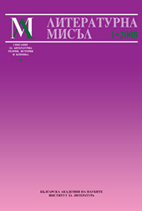Как с часовници се правят светове
How Clocks Create Worlds
Author(s): Cleo ProtohristovaSubject(s): Cultural history
Published by: Институт за литература - БАН
Keywords: Clocks; Worlds
Summary/Abstract: The paper presents the intricate itinerary of the timepiece concept in European culture from the Middle Ages to the 18th century through different discoursive fields such as astronomy, geography, theology, philosophy, natural history, ethics, literature, etc. The conceptual evolution of the clock in European history is reconstructed by the survey of the changing perceptions, roles and functions of timepieces in European culture. Utilised initially in the Middle Ages as a regulator of human activities, caught within profane, cyclic time (versus eternity), and throughout the Renaissance as a vehicle to take sailors across the seas, later in the 17th century the clock turned into a specific megametaphor of European culture. Imagined as a divine mechanism presenting the Universe as God’s creation, the clock was established as a universal sign capable of designating numerable aspects of man and the world. Most specific proved to be the development of the timepiece concept in the 18th century when it was introduced in literature (mainly as a detested symbol of bourgeois orderliness and social compulsion) and consequently was appropriated (and misappropriated) by incompatible social discourses.
Journal: Литературна мисъл
- Issue Year: 2008
- Issue No: 1
- Page Range: 43-54
- Page Count: 11
- Language: Bulgarian
- Content File-PDF

